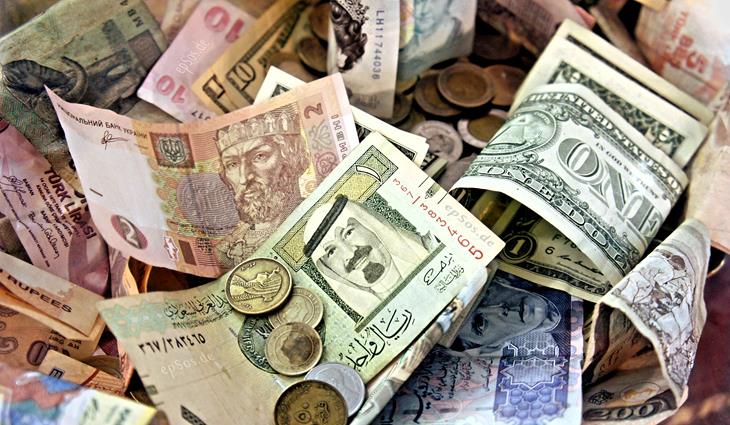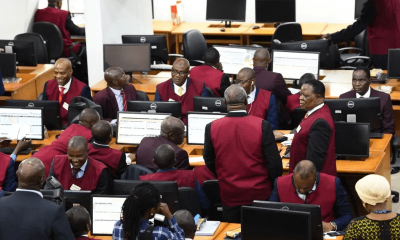Economy
Investors May Soon Dump Nigeria, SA, Egypt for Kenya, Ethiopia—Report

By Modupe Gbadeyanka
According to the newly released Africa Risk-Reward Index developed by Control Risks and Oxford Economics, Kenya and Ethiopia may soon outshine Africa’s economic giants; Nigeria, South Africa and Egypt, in the competition for investments.
It was only this month that Nigeria and South Africa exited recession, but rising security risks and political instability in Egypt, economic downturn and militancy in Nigeria and escalating political risks in South Africa led to doubts whether the balance between risks and opportunities in these markets is still favourable for businesses.
In the report made available to Business Post, Senior Analyst for Africa at Control Risks and lead-author of the report, Mr Paul Gabriel, commented that, “Experienced investors – not only in Africa, but around the world – know that risk and reward are close companions.
“While no serious investor should overlook the economic giants of the continent, real competitive edge can only be achieved when investors manage to stay ahead of the pack in knowing what’s next.
“The Africa Risk-Reward Index helps investors to identify some of the more hidden investment opportunities in times where the heavy-hitters are struggling.”
Key findings of the report showed that Nigeria and its energy sector are too big to lose their appeal because the country’s reward score is 6.0 (out of 10), ahead of South Africa and Egypt.
Nigeria’s charms, however, fade against a risk score of 7.3 (out of 10), as President Muhammadu Buhari’s government struggles through its first term.
A fall in oil prices and lower production due to insurgent attacks in the Niger Delta have slashed growth from 6.3 percent in 2014 to 2.7 percent in 2015 followed by a sharp contraction of 1.6 percent last year.
Economic indicators for this year are more favourable, but still the report forecasts a real GDP growth of only 1.1 percent in 2017.
On the part of South Africa, its risk score of 5.0 remains below the region’s average, but the reward score of 4.6 is also low.
Whilst the country enjoys a deserved reputation as Africa’s pre-eminent constitutional democracy, several of its key institutions have gradually weakened over the past decade.
Economic prospects are closely linked to the outcomes of the ANC’s national conference in December.
The forecasted real GDP growth of 0.5 percent for 2017 is below population growth and certainly insufficient to reduce South Africa’s staggering 27.7 percent unemployment rate.
The report also said Egypt will test the most ardent optimist. President Abdul Fatah al-Sisi’s political position is stable, despite a series of economic and security challenges, reflected in the country’s risk score of 6.0.
Socio-economic grievances, a government crackdown on opposition and Islamist groups and persistent militancy will continue to have an impact on the business environment. The tourism sector remains depressed.
The country’s reward score of 5.5 reflects the measures the government has taken since mid-2016 to address its fiscal problems.
Real GDP growth is expected to slow in 2017 (to 3.8 percent, from 4.3 percent in 2016) owing to a slowdown in government and private consumption.
Ethiopia outperforms every African peer with its high reward score of 8.0. Notably, it attracted $3.2 billion of foreign direct investment in 2016 – more even than Nigeria, and double the figure for Morocco.
The East African nation is one of Africa’s fastest growing economies and continues to offer strong prospects.
Growth averaged 10 percent from 2010 to 2015 and although 2016 growth was slower at 6.5 percent the expansion remains impressive.
However, the omnipresent role of government in the economy raises concerns relating to public sector efficiency and financial management.
External debt is expected to increase to 38.7 percent of GDP by the end of this year, leading to a risk score of 5.8.
Kenya has achieved a period of strong GDP growth amid relative political stability: real GDP growth averaged at 6.0 percent in 2010-16. The 2017 growth forecast is at 5.4 percent. The country’s reward score is 6.7.
A well-educated workforce and an innovative service sector, the government’s continued investments in upgrading critical national infrastructure, and deepening integration with its neighbours through the East African Community (EAC) all allow the country to act as a gateway into the larger East Africa region.
Current fiscal concerns and a political system that remains closely tied to ethnic affiliation contribute to a risk score of 5.6 and reflects considerable room for improvements.
Economy
Champion Breweries Concludes Bullet Brand Portfolio Acquisition

By Aduragbemi Omiyale
The acquisition of the Bullet brand portfolio from Sun Mark has been completed by Champion Breweries Plc, a statement from the company confirms.
This marks a transformative milestone in the organisation’s strategic expansion into a diversified, pan-African beverage platform.
With this development, Champion Breweries now owns the Bullet brand assets, trademarks, formulations, and commercial rights globally through an asset carve-out structure.
The assets are held in a newly incorporated entity in the Netherlands, in which Champion Breweries holds a majority interest, while Vinar N.V., the majority shareholder of Sun Mark, retains a minority stake.
Bullet products are currently distributed in 14 African markets, positioning Champion Breweries to scale beyond Nigeria in the high-growth ready-to-drink (RTD) alcoholic and energy drink segments.
This expansion significantly broadens the brewer’s addressable market and strengthens its revenue base with an established, profitable portfolio that already enjoys strong brand recognition and consumer loyalty across multiple markets.
“The successful completion of our public equity raises, together with the formal close of the Bullet acquisition, marks a defining moment for Champion Breweries.
“The support we received from both existing shareholders and new investors reflects strong confidence in our long-term strategy to build a diversified, high-growth beverage platform with pan-African scale.
“Our focus now is on disciplined execution, integration, and delivering sustained value across markets,” the chairman of Champion Breweries, Mr Imo-Abasi Jacob, stated.
Through this transaction, Champion Breweries is expected to achieve enhanced foreign exchange earnings, expanded distribution leverage across African markets, integrated supply chain efficiencies, portfolio diversification into high‑growth consumer beverage categories, and strengthened presence in the RTD and energy drink segments.
The acquisition accelerates Champion Breweries’ transition from a regional brewing business to a multi-category consumer platform with continental reach.
Bullet Black is Nigeria’s leading ready-to-drink alcoholic beverage, while Bullet Blue has built a strong presence in the energy drink category across several African markets.
Economy
M-KOPA Nigeria Plans Expansion to Edo, Others After N231bn Credit Milestone

By Adedapo Adesanya
Emerging market fintech firm, M-KOPA, has announced plans to deepen its reach in Nigeria to the South South and South East regions, starting with Edo this year, after providing N231 billion in credit to over 1 million customers in the country.
The firm released its first Nigeria-focused Impact Report, which showed that Nigeria is M-KOPA’s fastest-growing market and fastest to reach the milestone.
Since its foray into the Nigerian market in 2019, M-KOPA has been working to dismantle barriers to financial inclusion by providing flexible smartphone financing and digital financial tools that align with how people in the informal economy earn and manage their money.
It operates in six states in the country, including Lagos, Ogun, and Oyo, among others.
The report highlights the company’s contribution to income generation, digital inclusion and economic opportunity for Every Day Earners across the country.
The report showed that M-KOPA has enabled 290,000 first-time smartphone users, while 56 per cent of agents accessed their first income opportunity through the platform.
It showed high income and livelihood gains among its users, with about 77 per cent of customers leveraging smartphones or digital loans obtained through the platform to generate income, indicating that access to financed devices is directly supporting micro-entrepreneurial activity and informal sector productivity.
Furthermore, 75 per cent of users report higher earnings since gaining access to M-KOPA’s services, suggesting measurable improvements in personal revenue streams. On the distribution side, 99 per cent of agents disclose increased earnings, reflecting positive spillover effects across the company’s value chain.
In addition, 81 per cent of long-term customers state that their household expenses have improved, pointing to enhanced financial stability and better consumption smoothing over time.
Speaking on the report, Mr Babajide Duroshola, General Manager, M-KOPA Nigeria, said, “Nigeria represents extraordinary potential, and we’re proud that it has become M-KOPA’s fastest-growing market. Our Impact Report shows that when Every Day Earners gain access to the right digital and financial tools, they use them to create stability and long-term progress for their families. This is about access that unlocks opportunity and sustained prosperity.”
On its expansion plans Nigeria-wide, the M-KOPA helmsman said, “Many of the states we are considering are already similar to the ones we are currently in proximity… So, there is proximity and similarity between these states, and that’s what we are going to do, starting with Edo.”
He noted that as M-KOPA Nigeria continues to expand, the focus remains on ensuring more everyday earners gain access to the digital and financial tools they need to build resilient, prosperous futures in Nigeria’s rapidly digitising economy.
Economy
Tinubu Okays Extension of Ban on Raw Shea Nut Export by One Year

By Aduragbemi Omiyale
The ban on the export of raw shea nuts from Nigeria has been extended by one year by President Bola Tinubu.
A statement from the Special Adviser to the President on Information and Strategy, Mr Bayo Onanuga, on Wednesday disclosed that the ban is now till February 25, 2027.
It was emphasised that this decision underscores the administration’s commitment to advancing industrial development, strengthening domestic value addition, and supporting the objectives of the Renewed Hope Agenda.
The ban aims to deepen processing capacity within Nigeria, enhance livelihoods in shea-producing communities, and promote the growth of Nigerian exports anchored on value-added products, the statement noted.
To further these objectives, President Tinubu has authorised the two Ministers of the Federal Ministry of Industry, Trade and Investment, and the Presidential Food Security Coordination Unit (PFSCU), to coordinate the implementation of a unified, evidence-based national framework that aligns industrialisation, trade, and investment priorities across the shea nut value chain.
He also approved the adoption of an export framework established by the Nigerian Commodity Exchange (NCX) and the withdrawal of all waivers allowing the direct export of raw shea nuts.
The President directed that any excess supply of raw shea nuts should be exported exclusively through the NCX framework, in accordance with the approved guidelines.
Additionally, he directed the Federal Ministry of Finance to provide access to a dedicated NESS Support Window to enable the Federal Ministry of Industry, Trade and Investment to pilot a Livelihood Finance Mechanism to strengthen production and processing capacity.
Shea nuts, the oil-rich fruits from the shea tree common in the Savanna belt of Nigeria, are the raw material for shea butter, renowned for its moisturising, anti-inflammatory, and antioxidant properties. The extracted butter is a principal ingredient in cosmetics for skin and hair, as well as in edible cooking oil. The Federal Government encourages processing shea nuts into butter locally, as butter fetches between 10 and 20 times the price of the raw nuts.
The federal government said it remains committed to policies that promote inclusive growth, local manufacturing and position Nigeria as a competitive participant in global agricultural value chains.
-

 Feature/OPED6 years ago
Feature/OPED6 years agoDavos was Different this year
-
Travel/Tourism10 years ago
Lagos Seals Western Lodge Hotel In Ikorodu
-

 Showbiz3 years ago
Showbiz3 years agoEstranged Lover Releases Videos of Empress Njamah Bathing
-

 Banking8 years ago
Banking8 years agoSort Codes of GTBank Branches in Nigeria
-

 Economy3 years ago
Economy3 years agoSubsidy Removal: CNG at N130 Per Litre Cheaper Than Petrol—IPMAN
-

 Banking3 years ago
Banking3 years agoSort Codes of UBA Branches in Nigeria
-

 Banking3 years ago
Banking3 years agoFirst Bank Announces Planned Downtime
-

 Sports3 years ago
Sports3 years agoHighest Paid Nigerian Footballer – How Much Do Nigerian Footballers Earn
























